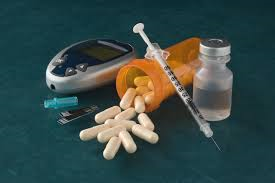 This page is designed to supplement information given to patients with type 2 diabetes .
This page is designed to supplement information given to patients with type 2 diabetes .
When diagnosed with diabetes for the 1st time and during an annual review you will be given a written care plan which advises you of your goals during the year.
Most patients with type 2 diabetes will benefit from regular (daily) exercise , A low carbohydrate (low GI diet) ,weight loss ( if they are overweight), a normal blood pressure, low cholesterol and a normal blood glucose (which is measured by a special test called Hba1c).
The advise we give and the medications you take are designed to help achieve all these goals.
What is type 2 diabetes?
In summary for a variety of reasons (often related to a high carbohydrate intake, lack of exercise and being overweight) the body's Pancreas which produces insulin to control the blood glucose level wears out so that it is no longer able to produce enough insulin to keep a normal blood glucose level. It continues to wear out further with the passage of time so that the patient eventually needs to go on insulin. This process can be slowed down or stopped if the patient adopts a healthy lifestyle of regular exercise, weight loss to a normal weight, and a low GI diet ( a leaflet on this is available to download on this page). Medication for Diabetes can also slow down this process
If your blood glucose is high you can get complications - why?
The glucose in your blood is fuel for your body similar to what petrol is for a car engine
Imagine what happens if too much petrol goes through a car engine--it will burn the engine out. Blood glucose is similar- if the levels are too high, it damages important tissues so that with the passage of time there is a risk of damage to eyes causing blindness, heart, kidneys, and the nervous system.
In addition a high cholesterol, high BP, smoking cigarettes add to this damage more rapidly.
So patients with diabetes will be encouraged to exercise daily, lose weight if appropriate and try to have a healthy low GI diet. They will be encouraged to stop smoking and other risk factors such as raised BP and cholesterol need to be treated.
Most patients will be asked to take medication to control their blood glucose , lower their cholesterol and treat raised blood pressure.
In order to ensure there are no complications, all patients with type 2 diabetes require regular (at least once per year) checks at the surgery which include BP, weight and foot checks at the surgery as well as blood and urine tests to check blood glucose control, cholesterol and kidney function. In addition an appointment will be sent to you to have a digital eye (retinal) check at the Hesa Centre. All these checks are to ensure no complications have occurred. If complications occur they can often be treated if spotted early
When you are diagnosed with diabetes you will be given information about the condition and referred to a local education program. We will also give you a personalised annual care plan outlining your targets.
We ask to see you after you have had blood and urine tests at least once per year (more frequently if you have poor control) when we will carry out the necessary checks- we will give you an annual care plan to ensure you understand your goals.
Before you book for an annual review please ensure you have had your blood and urine checks -you can ask reception to pick up your blood and urine test request forms- the test can be done either at Hesa by appointment or at Hillingdon Hospital (no appointment necessary-weekdays)-Please make an appointment to see a doctor about a week after the tests
Some important leaflets & Videos we ask you to read/watch are available to download here
overview of type 2 diabetes (also available from patient.co.uk)
dietary_advice_in_type_2_diabetes
Video on low carbohydrate diet
A wealth of information is also available at
Diabetes.org.uk and patient.co.uk